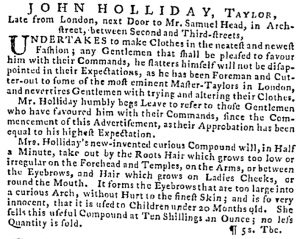What was advertised in a colonial American newspaper 250 years ago this week?

“JOHN HOLLIDAY, TAYLOR … UNDERTAKES to make Clothes in the neatest and newest Fashion.”
John Holliday and his wife ran an advertisement in the Pennsylvania Gazette throughout most of 1767. The Adverts 250 Project previously featured that advertisement, examining how the couple surreptitiously inserted information about “Mrs. Holliday’s new-invented curious Compound” for removing unwanted facial hair at the end of an advertisement that, at a glance, focused primarily on John’s services as a tailor.
The Hollidays’ advertisement demonstrates one strategy female entrepreneurs used to promote their participation in the marketplace without independently publishing newspaper notices, yet the initial portion dedicated to John’s enterprise includes fairly rare commentary on attitudes about the effectiveness of advertising in eighteenth-century America. “Mr. Holliday humbly begs Leave to refer to those Gentlemen who have favoured him with their Commands, since the Commencement of this Advertisement, as their Approbation has been equal to his highest Expectation.” In other words, Holliday acknowledged that business had increased since first placing the advertisement and he attributed that development to his marketing efforts rather than other circumstances. Perhaps Holliday’s advertisement had been successfully because he did not merely announce that he had set up shop. Instead, he listed his qualifications, noting that he had previously been employed as “Foreman and Cutter-out to some of the most eminent Master-Taylors in London.” Such a pedigree likely caught the attention of status-conscious residents of the largest and most cosmopolitan city in the colonies!
Furthermore, Holliday attempted to use his new clients to incite additional demand for his services. Shortly after arriving in Philadelphia from London, he promised that “any Gentlemen that shall be pleased to favour him with their Commands … will not be disappointed” with the garments he made “in the neatest and newest Fashion.” According to this advertisement, several “Gentlemen” indeed “favoured him with their Commands” and thought so highly of the work he completed for them that other potential clients should consider that sufficient testimonial to also engage his services.
